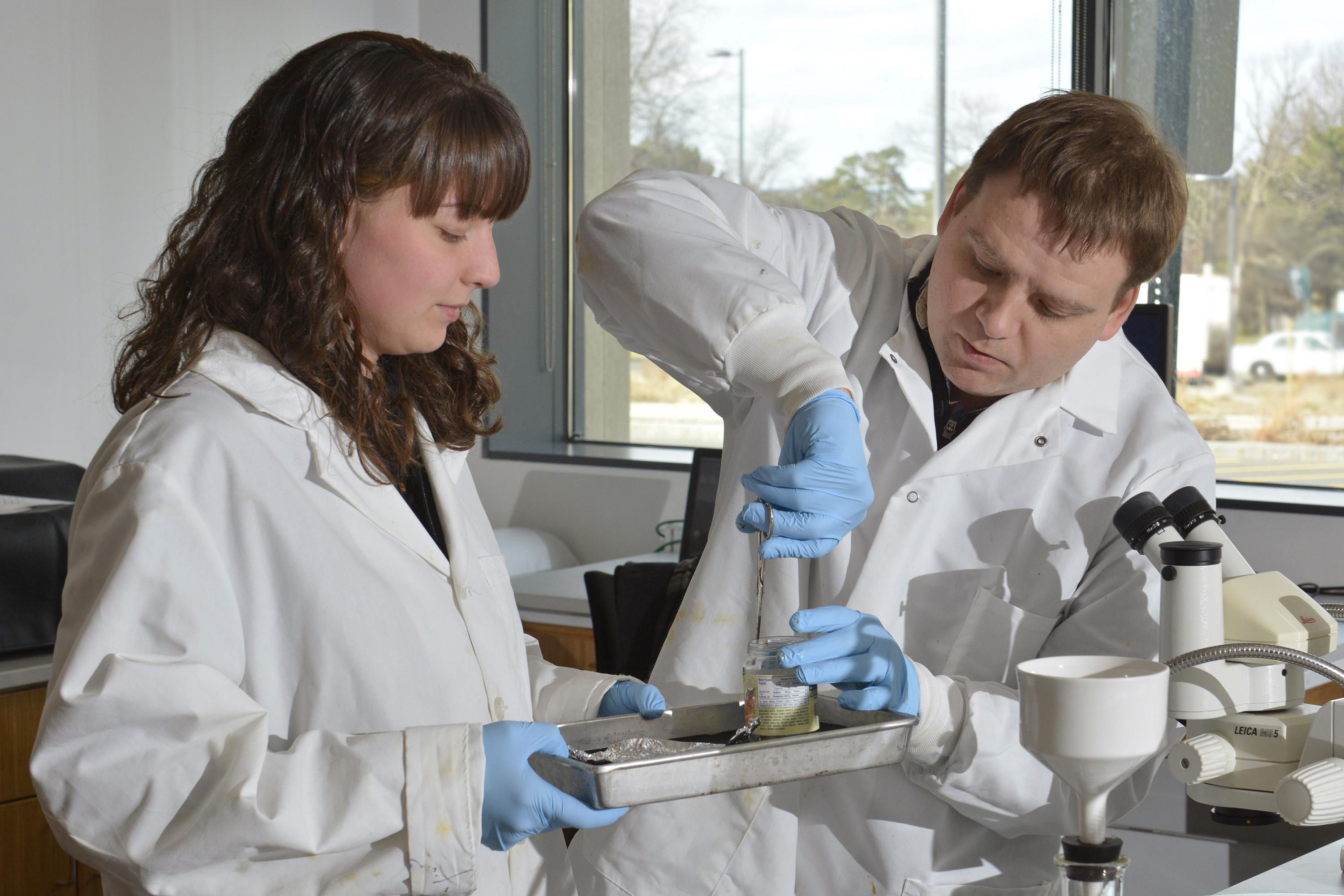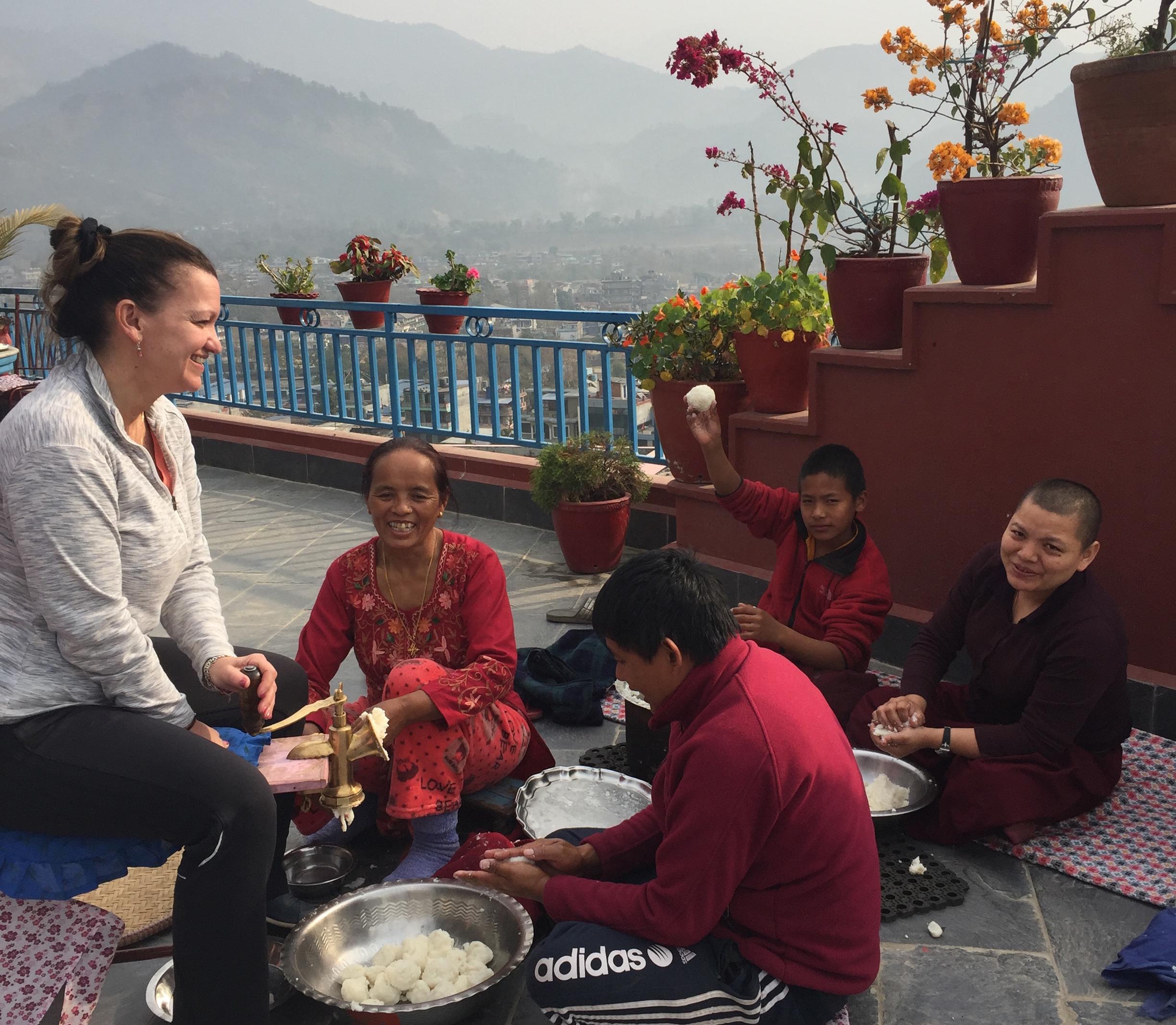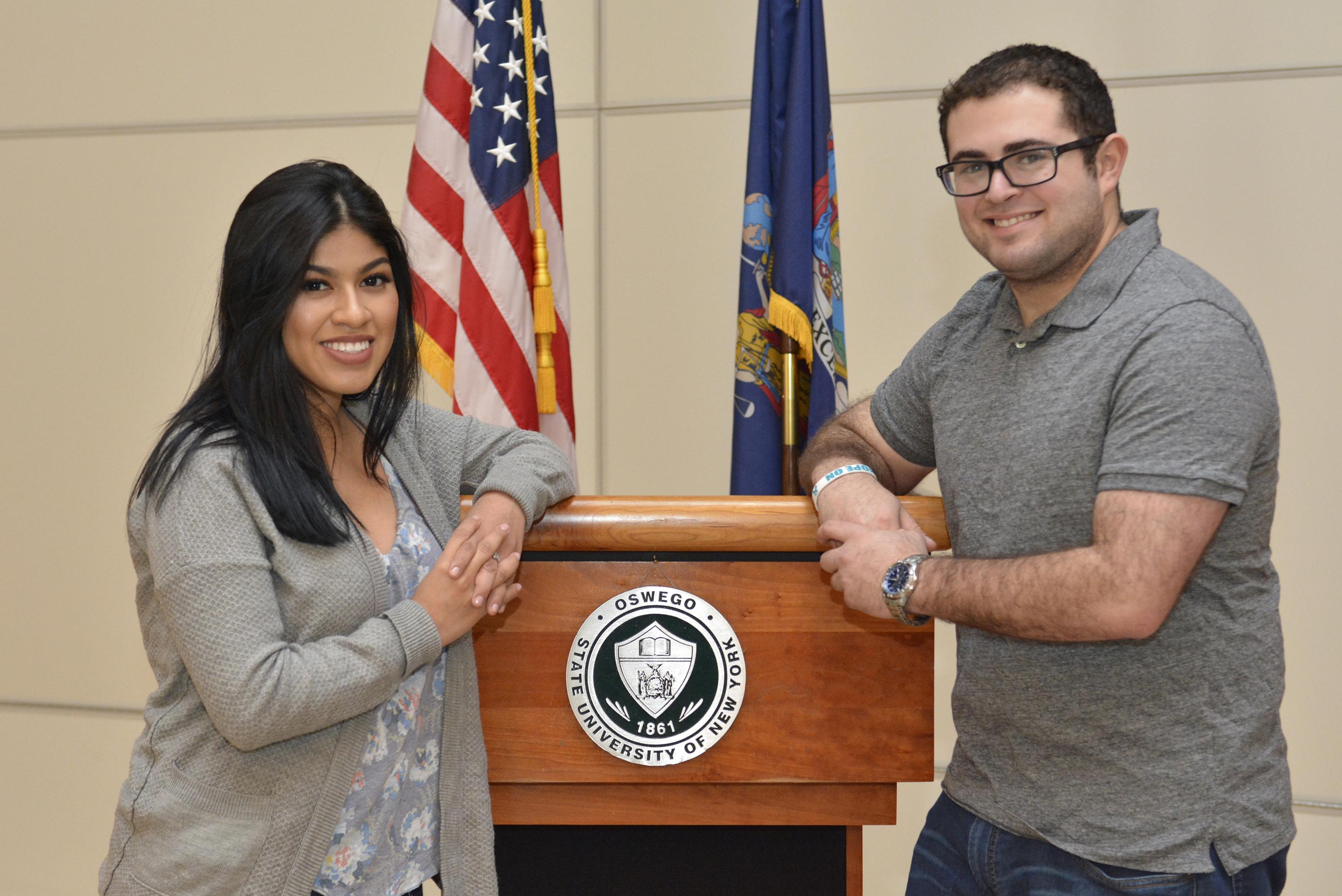
From Nepalese mindfulness to pollutants in fish, Quest to engage scores of topics
Office of Communications and Marketing
Published
Exacting work -- Student researchers Nina House (left) and Scott Minihkeim, both SUNY Oswego biology majors, demonstrate a step in their examination of Lake Ontario fish stomachs for evidence of microplastics deposited in the water from clothing and cosmetics. They will present results at Quest and later will inform a wide range of experts at a research conference on the Great Lakes.
SUNY Oswego's Quest 2017, a daylong symposium on Wednesday, April 5, to celebrate scholarly and creative activities on campus, promises a rich array of faculty-mentored student presentations, demonstrations, debates, exhibitions and panel discussions.
Marano Campus Center and Shineman Center will showcase opportunities to hear about and see projects that range academically from art to zoology and geographically from Cuba to Nepal.
Quest is free and open to the public. Parking is available in lots off Centennial Boulevard adjacent to Marano Campus Center and across from Shineman Center. A detailed schedule will be available prior to April 5 at oswego.edu/quest.
Following is just a sampling among scores of 2016-17 efforts to advance scholarship and the fine arts at SUNY Oswego.
Lake pollution
Biology majors Nina House and Scott Minihkeim will present findings that promise to help quantify the threat of microplastics making their way into Lake Ontario. Their examination of 330 stomachs of forage fish -- round goby, deepwater sculpin and alewife -- found evidence of the tiny fibers and pellets in all but nine specimens.
"PCBs can adhere to the plastics, which can harm endocrine systems of fish and make their way to us," said House, a Phoenix native who minors in sustainability studies at SUNY Oswego. "If you're not aware of a problem, you're not going to do anything about it."
The students' mentor, C. Eric Hellquist of the biological sciences faculty, said experts who have seen House's and Minihkeim's work have lauded its quality. They are finishing a paper co-authored by Hellquist and Maureen Walsh, formerly of the U.S. Geological Survey in Oswego, who supplied fish samples from around the lake. The project's abstract has been accepted for presentation at the May meeting of the International Association of Great Lakes Researchers in Detroit.
House and Minihkeim have done exacting work extracting and dissolving the fish stomachs, filtering for microplastics -- which enter the water from such waste as fibers from fleece jackets and beads from cosmetic products -- and literally counting the tiny pieces of evidence.
"I'm planning to become a physician's assistant," said Cato resident Minihkeim. "But this research is valuable, and I enjoy and care about the environment."
Mindfulness at work -- The daily life of Nepali at a private monastery is challenging, yet they find happiness in all they do, said SUNY Oswego graduate student Danielle Carr (left). Making rice noodles (from left) are Guru's wife; a young monk-in-training named Mahendra; Pendi, Guru's daughter, who is a Buddhist nun in training; and another monk in training.
Monks' mindfulness
Danielle Carr, a graduate student in SUNY Oswego's mental health counseling program who also teaches seventh-grade social studies in Carthage, aims to present at Quest how her observations of Nepalese monks' mindfulness have augmented her coursework and clinical experience with Western techniques.
Carr, a 21-year Army veteran who aims to counsel active military, veterans and their families, said she was afforded generous access and opportunities during a volunteer assignment teaching English to monks at a private monastery in Nepal for two weeks in February.
"It was fascinating," she said. "Everything they do throughout the day is based on mindfulness. It was extraordinary to see people who live all day, every day in the moment."
Despite living conditions that Americans would term "impoverished," she said the monks "are so happy and so grateful living this life. They laugh all day long, they are happy and they interact with each other."
The monks engage all their senses in long sessions of prayer, eating with their hands despite the availability of utensils, and in other work, play and relationships in their lives.
"Western notions of mindfulness meditation have their roots in Buddhism," Carr said. "I chose Nepal to learn more about Buddhism. Who better to learn it from?"
Her campus mentor, Terrance O'Brien of the counseling and psychological services faculty, said mindfulness is important to clinicians working with veterans and other clients, because it stills the anxious, fearful mind. "She's going to teach my class, incorporating what she learned in Nepal," O'Brien said.
Debaters prepare -- SUNY Oswego senior broadcasting and mass communication majors Itzel Flores (left) and Jackson Berner pause for a photo during preparations for a coming debate between four-person teams from Oswego and Brockport during Quest on the issue "Resolved: Colleges and universities have a moral obligation to prohibit public expressions of hate speech on campus."
Debate is on
Student debate teams from Oswego and Brockport will square off at Quest, contributing to the revival of intercollegiate debate, once a competitive staple among colleges.
"I like to argue and to pull around (influence) people's opinions," said Itzel Flores, a SUNY Oswego senior in broadcasting and mass communication. "I like the combination of public speaking and critical thinking."
Another member of the debate team, Jackson Berner, also made the "I like to argue" argument.
"And I'm loud -- it's a perfect fit," said the senior in broadcasting and mass communication. "If it's a topic I'm passionate about, I have no problem doing research in depth."
Thomas Downs, co-organizing the debate with communication studies faculty colleague Gabe Hardy, said the debate will center on a topic with high currency. "Resolved: Colleges and universities have a moral obligation to prohibit public expressions of hate speech on campus."
A 40-year-veteran debate coach, Downs said students need to be prepared to argue both pro and con. There will be a debate rematch at Brockport.
"The thought process these students invest goes far, far beyond what the average person in the street or voters put into research, analysis and thought on the issues involved," said Downs, whose courses include one on argumentation and debate. "They invest themselves in the work, then they must express it effectively."
Berner said the values and disciplines debate teaches are crucial to civic life in this polarized age.
"If you are constantly screaming your opinions into an echo chamber, your arguments are never going to get any better," he said.




